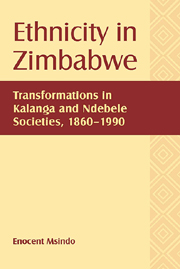Book contents
- Frontmatter
- Contents
- List of Illustrations
- Acknowledgments
- List of Abbreviations
- Note to the Reader
- Introduction
- 1 Ethnicity and Identities in Matabeleland
- 2 Domination and Resistance: Precolonial Ndebele and Kalanga Relations, 1860–93
- 3 Remaking Communities on the Margins: Chieftaincy and Ethnicity in Bulilima-Mangwe, 1893 to the 1950s
- 4 Ultraroyalism, King's Cattle, and Postconquest Politics among the Ndebele, 1893 to the 1940s
- 5 Language and Ethnicity in Matabeleland
- 6 Contests and Identities in Town: Bulawayo before 1960
- 7 Complementary or Competing? Ethnicity and Nationalism in Matabeleland, 1950–79
- 8 Postcolonial Terror: Politics, Violence, and Identity, 1980–90
- Conclusion
- Notes
- Selected Bibliography
- Index
- Rochester Studies in African History and the Diaspora
8 - Postcolonial Terror: Politics, Violence, and Identity, 1980–90
Published online by Cambridge University Press: 05 February 2013
- Frontmatter
- Contents
- List of Illustrations
- Acknowledgments
- List of Abbreviations
- Note to the Reader
- Introduction
- 1 Ethnicity and Identities in Matabeleland
- 2 Domination and Resistance: Precolonial Ndebele and Kalanga Relations, 1860–93
- 3 Remaking Communities on the Margins: Chieftaincy and Ethnicity in Bulilima-Mangwe, 1893 to the 1950s
- 4 Ultraroyalism, King's Cattle, and Postconquest Politics among the Ndebele, 1893 to the 1940s
- 5 Language and Ethnicity in Matabeleland
- 6 Contests and Identities in Town: Bulawayo before 1960
- 7 Complementary or Competing? Ethnicity and Nationalism in Matabeleland, 1950–79
- 8 Postcolonial Terror: Politics, Violence, and Identity, 1980–90
- Conclusion
- Notes
- Selected Bibliography
- Index
- Rochester Studies in African History and the Diaspora
Summary
Politics, Violence, and Identity, 1980-90
Because “speaking truth to power” in postcolonial Zimbabwe has generally been risky, the violence that happened in Matabeleland and Midlands between 1980 and 1987 has only begun to be sufficiently explored. Apart from pioneering anthropological work by Werbner, the richest historical study of this topic is Violence and Memory by Alexander, McGregor, and Ranger. Evidence of sordid, grotesque violence unleashed upon the inhabitants of Matabeleland and Midlands by government agents under the pretext of dealing with dissidents came to light with the publication of Breaking the Silence. Notwithstanding the high reputation of the authors of the report and the quality of the research they conducted among survivors of torture (atrocities that were condemned by Matabeleland activists as genocide), the report and this chapter alone do not adequately express that level of violence.
The violence meted out by government agents, chiefly against innocent Matabeleland and Midlands civilians, considerably affected Shona-Ndebele relations, and continues to do so. It also shaped Ndebele people's view of citizenship and their political character and further redefined Ndebele- Kalanga relations. The government's culture of impunity and its desire to arbitrarily obliterate popular memory has indirectly contributed to the emergence of civic societies championing the cause of survivors of torture. As a result of the rise of these civic societies, and also of the Movement for Democratic Change (MDC), whose president Morgan Tsvangirai did at one point tour the gukurahundi mass graves, individual and collective memories and tales of this state-sponsored violence have become firmly reinscribed in Zimbabwean society.
- Type
- Chapter
- Information
- Ethnicity in ZimbabweTransformations in Kalanga and Ndebele Societies, 1860-1990, pp. 211 - 228Publisher: Boydell & BrewerPrint publication year: 2012

